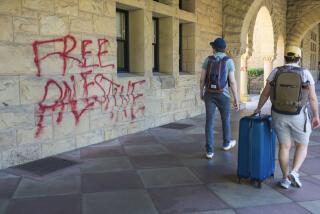Sad Day at Stanford
- Share via
Physicist Sidney Drell is not the only teacher at Stanford University with a passionate commitment to sharing knowledge he regards as important to the world. But he is the only one who has resigned because the Stanford bureaucracy could not find a way to give professors in arms control the same sort of academic standing that they could get, say, in history or law.
Stanford President Donald Kennedy said that Drell’s resignation saddened him and that he intended to keep trying to break the deadlock over faculty that led Drell to quit. Kennedy clearly appreciates the high quality of Drell’s operation, so it is a wonder that the problem was allowed to get out of hand.
Over nearly 20 years, Drell has helped Stanford build a center of excellence in arms control and strategic theory that has no equal in the United States. What sets it apart from centers on other campuses is that Drell’s scholars concentrate on teaching students how they should think about arms control. There is a tendency at other campuses to try to teach students what they should think about it.
Drell divides his time on campus between Stanford’s Center for International Security and Arms Control and the Stanford atom-smasher,of which he is a co-director. He also is a consultant to the federal government on arms and arms control, and is a leading opponent of the Pentagon’s racehorse approach to the development of “Star Wars” defenses against nuclear missiles. He argues for a more deliberate and thorough research program that would cost no more than half as much as the present program and still ensure that the United States will not be surprised by Soviet discoveries.
Drell says that the trouble started about two years ago when he tried to get a full professorship for one of his best lecturers and found that it could not be done. Drell’s team includes physicists with working experience in nuclear weapons, lawyers and diplomats who have actually negotiated arms agreements, as well as specialists in Soviet-American relations. Because of that, the center’s teachers are not part of departments like political science or economics. Because the departments have their own faculty members to reward, they are not willing to ship rewards into places like the arms-control center.
It probably makes sense when you are inside Stanford looking out. But from the outside looking in it does not seem nearly important enough to warrant even a slight weakening of the arms- control center, and that certainly will be the case if one of its most passionate advocates gets away.
More to Read
Sign up for Essential California
The most important California stories and recommendations in your inbox every morning.
You may occasionally receive promotional content from the Los Angeles Times.










